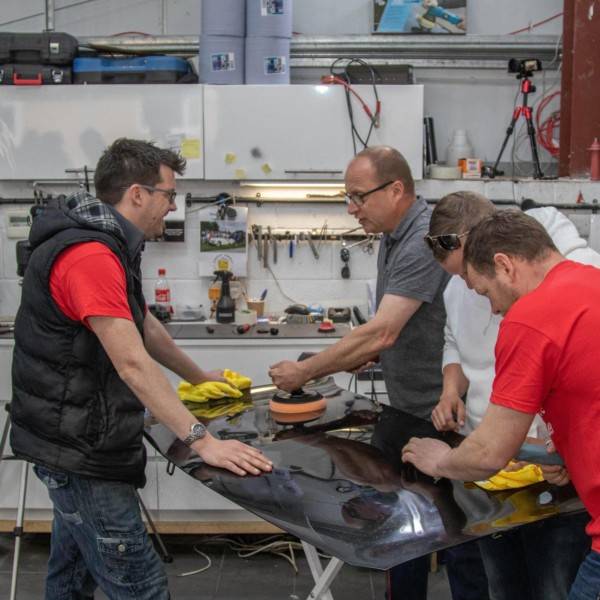
So you’re interested in joining the detailing industry and starting up a business? Or maybe it’s a hobby you’re looking for some professional instruction on, maybe to go pro in the future?
Getting trained – in anything – by experienced professionals is, unquestionably, the quickest way to start up with confidence, practical knowledge and assurance that you are completing a task safely, efficiently and with the best possible results at the end. But what should you look for in a training provider before you spend your money?
Will a cheap course teach you the same as an expensive one? Can anyone train you if they’ve done it themselves? What are some questions to ask when deciding where to go?
Here are 6 questions we feel you need to consider when finding a detailer training.
 1. Are they independent or brand-based trainers?
1. Are they independent or brand-based trainers?
Quite an important question as independence is an attractive trait in a training provider. Here’s why;
If you go to an independent trainer for tuition, they’re going to show you every product available on the market and give you an honest, real-world assessment of the pros and cons of each product, brand, style, etc. They make nothing from leading you in a particular direction, and you can find and discover a wide range of products to suit your particular needs.
If you go to a brand for training, or anyone who can sell you things as an uplift when teaching you how to use them, their primary purpose is to show you how to use as much of their product as possible. After all, that’s how they make money – by selling products, not with cheap training sessions.
This usually means (and these examples are from past attendees of such courses) extra unnecessary steps such as;
- 3 pre-washes before cleaning
- Using up to 4 separate shampoos at different stages
- or Up to 10 layers, in once case, of ceramic coating for “extra protection”, and other nonsense concepts to anyone who has an understanding of the chemistry.
This results in you paying to learn how to spend more money with them. That’s potentially fine if you like the products and go into the session aware of the upsell, but try to only take away any practical knowledge they can prove works, and make larger purchase decisions after comparing competitors.
 2. Are they insured?
2. Are they insured?
You’re paying someone for their knowledge, and trusting they are correct, therefore if you follow their advice and it proves damaging to your vehicle or a customer car you need to have recourse. This is where something called professional indemnity insurance comes into play and is a must for anyone who gives advice professionally. Without it, you would need to take the adviser to court and go through a costly legal battle to receive a penny of compensation for their damaging advice.
However, properly insured training businesses are covered for this, and the process can be handled between either your insurer and theirs, or claiming directly through their insurer. Ensure trainers hold specific training insurance that covers them, you and anything around you whilst teaching you – a clause in a generic valeting policy will generally only cover product sales and demonstration, potentially leaving you in a tricky spot should anything go wrong then or later on.
 3. Can they train YOU?
3. Can they train YOU?
Being a good detailer does not equate to being a good teacher – they are two entirely separate skills, and not everybody learns in the same way. Some respond well to direct information and a supervised practical demonstration, some prefer to learn as they do – watching and replicating, and some need certain aspects repeating again and again until something clicks mentally and they get it.
It’s not about special educational needs, EVERYONE learns in their own way, and being able to adapt and pivot how information is delivered and ensure that things are explained in a relatable manner is key to understanding v.s. just listening to someone parrot processes at you for three days and hope you take it all in. Our training is built on a background in education, and internal development has led us on specific courses in education psychology, educator practice, and communication to enable us to alter and adjust according to the trainee.
 4. Are they creating a safe environment for you to make mistakes?
4. Are they creating a safe environment for you to make mistakes?
Problems are the best learning experience. Fact.
When learning, you need to see the consequences of doing something incorrectly to understand why a process has been put in place. Whilst working on a Ferrari the first time you pick up a machine polisher makes for some cool photos, wouldn’t you prefer to experience a polisher burning through paintwork through on something more… Disposable?
Working on live cars is an important part of learning detailing, but those cars shouldn’t have an angry owner at the other end if something goes wrong, and the trainer would unlikely be insured for that scenario, potentially leaving you responsible.
Knowing that if you make a mistake there isn’t going to be an issue will relax your learning experience, and lets you push techniques as far as you can, so that when you see problems in the real world you’re better equipped to recognise the signs and stop before things get expensive. We teach using our own personal training fleet of vehicles, and start things like machine polishing on panels away from a car until you’re comfortable to move over to the real thing. Make the mistakes with us, and you won’t make them later on.
 5. Are they teaching you facts?
5. Are they teaching you facts?
This isn’t about truthfulness, but information is not the same as knowledge. With so many sources of information available to the world via the internet and relatively few genuine experts, we tend to accept authoritative sources without questioning the research behind them. But “everyone says” isn’t the same as “I can prove”…
For instance, there is a persistent myth that acid wheel cleaners will cause carbon ceramic disc brakes to fail prematurely at a cost of thousands. So we tested it, getting a set of used brake discs from some friends at the Nurburgring and placed chunks of the material in various acids to observe their breakdown and reaction.
None of them did, and we still keep a sample in our office to check it’s not going to happen years later. However, we discovered that silicones are a very real enemy of carbon ceramic discs as they absorb into the material, making them slippery again and again as the heat leeches the lubricant back out. Useful knowledge when applying dressings to tyres and wheels, especially if you want your customers to return…
We have the facilities and contacts to do the research that fuels our syllabus, and if we can’t explain it/prove it/demonstrate it, we don’t teach it.
 6. Is there support after you leave?
6. Is there support after you leave?
Whether your course is a day or a week-long, unless you have an eidetic memory you will struggle to retain every piece of information thrown at you – brains just don’t work like that.
Instead, you will remember highlights clearly, have recollections that you can remember after a bit of thought, and forget about 20% of the information given, filed away behind a wall of neurons as “less important knowledge right now”.
To remedy some of this, every course we run has an accompanying course book to cover all the set subject matter on the day, plus a bit more information and background on certain subjects, which you can refer to when you need a memory jog.
In addition, we not only offer, but actively encourage students to contact us with questions about their course material, whether next week, next month, or years in the future. We’re available on the phone, but prefer emails and messages, and if you can contact us before you make a mistake about something you’re unsure about it is preferable to trying to help you undo a mistake. We’re here when you need us, free of charge – no “support subscriptions” or “membership fees”.
UK Detailing Academy didn’t happen overnight. We’ve been here since 2016, training, mentoring and developing some of the best detailer and car care training in the world to give you the best possible start in car care. Our courses evolve when new technology emerges, and we strive to make every student that comes through our courses a success story – frankly, because it makes us look better! It’s why we have over a 70% return rate amongst students who keep coming back to develop their skills with us.
If you’re deciding where to train and start a new career, or develop existing knowledge; call around and ask these questions – then give us a call.

 1. Are they independent or brand-based trainers?
1. Are they independent or brand-based trainers? 2. Are they insured?
2. Are they insured? 3. Can they train YOU?
3. Can they train YOU? 4. Are they creating a safe environment for you to make mistakes?
4. Are they creating a safe environment for you to make mistakes? 5. Are they teaching you facts?
5. Are they teaching you facts? 6. Is there support after you leave?
6. Is there support after you leave?
